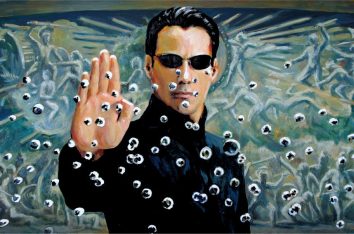In our last article we considered the fact that we as humans feel within ourselves a lack or a void that we want to overcome. We often look to some “sacred object” that, if attained, will give us the sense of fulfillment we crave.
We desperately want to avoid the void.
Consider the words of the “cunning serpent” in the creation account from Genesis 3. “You’re lacking something,” the serpent (who apparently could talk) told Adam and Eve. “But you don’t have to. You could avoid the void altogether and become just like God himself, if you would only eat the fruit from the forbidden tree.”
Sound familiar?
The serpent is giving voice to the exact same inner notion that I spoke about in my last post: “There is something amazing for you just over the horizon, but this forbidden fruit is standing in the way. If you would only transgress the prohibition you would be whole, God-like, and complete.”
I hinted earlier that perhaps the real problem is not the manner by which we are seeking to avoid the void, but the quest itself. In other words, our mistake is not that we are trying to heal ourselves with all the wrong remedies, but that we are trying to heal ourselves at all. The assumption that is doing the heavy lifting here is that any hole, void, or lack that we feel is obviously an aberration that interrupted our otherwise blissful condition, and our job is to overcome it.
Turns out, that notion is serpentine and, well, satanic. And from the look of it, so are most of our churches.
After all, what is the message proclaimed from the majority of American pulpits Sunday after Sunday? “You have a hole in your heart that needs to be filled, but you’re trying to fill it with all the wrong things. Sex, drugs, or alcohol can’t fill the void, only Jesus can.”
In other words, the problem isn’t the vending machine, the problem is that you’re pushing the wrong buttons.
This (rather typical) “gospel message” leaves the underlying satanic and serpentine structure safely and securely in place, while tinkering only with the details. Yes, we are told, you are correct to assume that this lack you feel is an unwelcome intruder, and yes, you are also correct in seeking to eliminate it. What you’re trying to do is right, but you’re just doing it wrong. But if you punch in the proper code, the vending machine will dispense the sense of wholeness and well-being you desire, and your lack will disappear.
And for some reason, the fact that this entire outlook was originally promulgated by the devil doesn’t seem to bother us in the slightest.




[…] to that Mosaic economy was the idea — initially suggested in the Garden and then illustrated by the architectural design of the Temple itself — that there is a […]